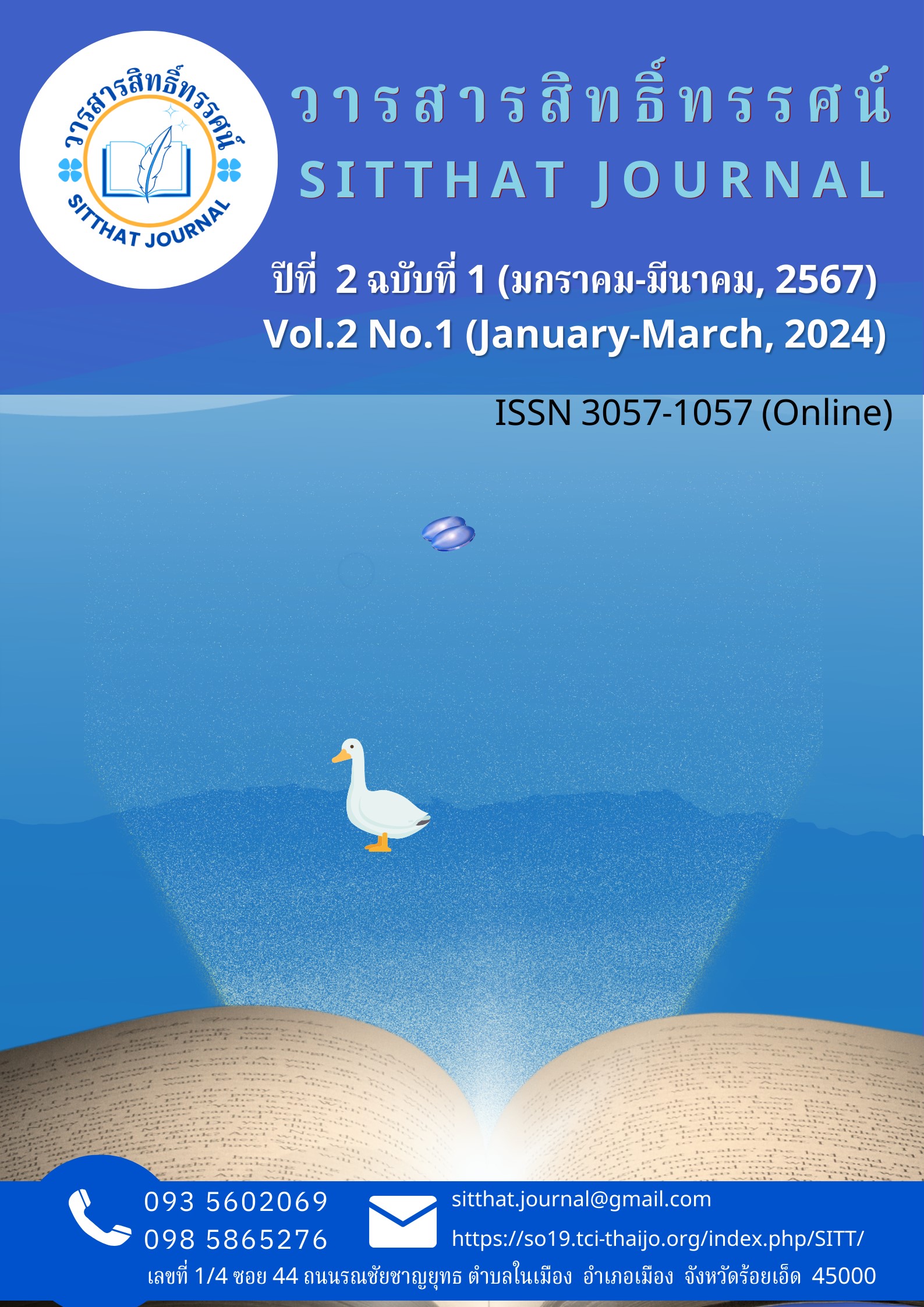FACTORS THAT ARE THE RELATIONSHIP BETWEEN THE PRINCIPLES OF SECULAR DHAMMA AND EFFICIENCY IN PERFORMING DUTIES OF PERSONNEL OF THESUBDISTRICT ADMINISTRATIVE ORGANIZATION IN KOSUM PHISAI DISTRICT MAHA SARAKHAM PROVINCE
Main Article Content
Abstract
The objectives of this research are (1) to study the relationship between the principles of secular dhamma and the performance of duties of sub-district administrative organization personnel (2) to study the factors that have a relationship between the principles of secular dhamma and the performance of duties of the organization's personnel Subdistrict Administrative Organization and (3) to study guidelines for developing the relationship between the principles of secularism and the performance of duties of Subdistrict Administrative Organization personnel in Kosum Phisai District The sample group included personnel of the Subdistrict Administrative Organization and those who came to receive services in Kosum Phisai District. Maha Sarakham Province, 359 people, and the target groups include Administrators and department heads in the Subdistrict Administrative Organization in Kosum Phisai District, totaling 10 people, were quantitative research and qualitative research Statistics using frequency distribution statistics and percentage of respondents Analyzed by presenting in tables using mean statistics and standard deviation multiple regression analysis using sequential variable selection method. Accompanying the discussion of results Data analysis and descriptive analysis the results of the research found that: (1) the relationship between the principles of Secular Dhamma and the performance of duties of Subdistrict Administrative Organization personnel in Kosum Phisai District. Maha Sarakham Province Overall, it is at a moderate level. (2) Factors that have a relationship between the principles of secularism and the performance of duties of subdistrict administrative organization personnel in Kosum Phisai District. Maha Sarakham Province Importantly, they include competence (X2), inspection system (X4), and relationships (X1), respectively and (3) various projects should be organized to suit personnel and various situations by being sincere in performing duties to serve the public. Be honest and sincere with each other in performing your duties and be punctual. Develop and increase efficiency in performing duties by training to build new skills and knowledge to keep up with the situation and have patience and tolerance and never give up when encountering obstacles and problems in the performance of duties As well as strengthening unity in the organization to be of one mind and organizing training for personnel to have a generous mind towards the public and co-workers for the efficiency of the organization.
Article Details

This work is licensed under a Creative Commons Attribution-NonCommercial-NoDerivatives 4.0 International License.
บทความนี้
References
กัลยา วานิชย์บัญชา.(2560). การวิเคราะห์สถิติชั้นสูงด้วย SPSS for Window (พิมพ์ครั้งที่ 12). กรุงเทพฯ:
ห้างหุ้นส่วนจํากัด สามลดา.
กรมส่งเสริมการปกครองส่วนท้องถิ่น. (2560). รายงานสรุปผลการประเมินประสิทธิภาพขององค์กรปกครอง
ส่วนท้องถิ่นประจำปี 2560. กรุงเทพฯ: กรมส่งเสริมการปกครองส่วนท้องถิ่น.
จินตวีร์ เกษมศุข. (2559). หลักการมีส่วนร่วมกับการพัฒนาชุมชนอย่างยั่งยืน. กรุงเทพฯ: สำนักพิมพ์แห่ง
จุฬาลงกรณ์มหาวิทยาลัย.
พระมหายศวิภรณ์ เปมสีโล (ตั้งคำ) และคณะ. (2561). การบูรณาการหลักฆราวาสธรรมกับการปฏิบัติตนของ
ครอบครัวไทย ยุคไทยแลนด์ 4.0. วารสารสังคมศาสตร์และมานุษยวิทยาเชิงพุทธ, 3(2), 44 – 62.
พระครูสังฆรักษ์แดนชัย อภิชโย, พระครูวิรัตธรรมโชติ,กันตภณ หนูทองแก้ว. (2562). การใช้หลักฆราวาสธรรม
ในการพัฒนาคุณภาพชีวิตของประชาชนในเขตเทศบาลตำบลสทิงพระ อำเภอสทิงพระ
จังหวัดสงขลา. วารสารวิชาการ มจร. บุรีรัมย์, 4(2), 24 – 34.
พระครูสุมนธรรมนาถ. (2565). การบริหารงานบุคคลตามหลักฆราวาสธรรมของผูบริหารโรงเรียนพระปริยัติ
ธรรม แผนกสามัญศึกษา จังหวัดเลย. วารสารสังคมศาสตร์บูรณาการ, 2(5), 33 – 41.
พระธรรมเจดีย์ (ประกอบ ธมฺมเสฏโฐ). (2552). หลักฆราวาสธรรม 4. พิมพ์ครั้งที่ 2. กรุงเทพฯ : สหธรรมิก.
พระพรหมคุณาภรณ์ (ป.อ.ปยุตโต). (2550). ธรรมนูญชีวิต. พิมพ์ครั้งที่ 4. กรุงเทพฯ : สํานักงาน
พระพุทธศาสนาแห่งชาติ.
วีระศักดิ์ เครือเทพ. (2560). ผลึกความคิด...การบริหารจัดการที่ดีขององค์กรปกครองส่วนท้องถิ่น. กรุงเทพฯ:
โรงพิมพ์แห่งจุฬาลงกรณ์มหาวิทยาลัย.
Yamane, Taro. (1973). Statistics an introductory analysis. New York Harper & Row.


